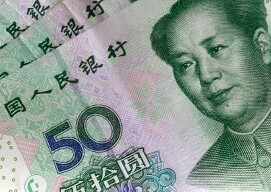The Chinese yuan is weakening against a basket of currencies midweek as global markets are still reeling from the incoming US tariff hikes on billions in Chinese imports. Beijing has promised it will retaliate, despite reportedly being closer to a new trade agreement. Investors are also combing through new trade data that surprised market forecasts.
President Donald Trump shocked global markets this week when he tweeted that he would be raising tariffs from 10% to 25% on $200 billion in Chinese goods on Friday. Equities everywhere plunged, leaving stock indexes drowning in red ink. Traders fear that not only will economic growth suffer, but also that the tariffs will throw a wrench in trade negotiations this week as a Chinese delegation is in Washington to discuss a new agreement.
The president confirmed that Vice Premier Liu He was coming to Washington as part of the delegation. According to Trump, the vice premier will meet him âto make a dealâ at the White House. But Beijing has said that it is âfully prepared for an escalated trade war,â adding that it might impose countermeasures to retaliate against the tariffs.
Trump tweeted on Wednesday:
The reason for the China pullback & attempted renegotiation of the Trade Deal is the sincere HOPE that they will be able to ânegotiateâ with Joe Biden or one of the very weak Democrats, and thereby continue to ripoff the United States (($500 Billion a year)) for years to come…. Guess what, thatâs not going to happen! China has just informed us that they (Vice-Premier) are now coming to the U.S. to make a deal. Weâll see, but I am very happy with over $100 Billion a year in Tariffs filling U.S. coffers…great for U.S., not good for China!
It has been reported that US officials are unhappy with China reneging on trade commitments, but the administration, calling it âunacceptable,â refrained from listing what exactly Beijing failed to do.
On the data front, Chinese exports declined 2.7% in April to $193.49 billion, down from the 14.2% increase in March. This is lower than the median estimate of a 2.3% jump. Chinese imports rose 4% last month to $179.65 billion, up from the 7.6% contraction in the previous month. This is also lower than the market projection of a 7.6% slide.
Overall, Chinaâs trade surplus tumbled to $13.84 billion in April, down from $26.21 billion at the same time a year ago, according to the General Administration of Customs.
As part of another push to stimulate the economy, the Peopleâs Bank of China (PBOC) cut reserve requirement ratios (RRRs) again on Monday. The PBOC wants to release roughly $41 billion for small- medium-sized banks, allowing companies to borrow more. This move would represent the smallest amount of cash that financial institutions are required to hold in reserves since January 2018.
The USD/CNY currency pair rose 0.09% to 6.7829, from an opening of 6.7769, at 16:06 GMT on Wednesday. The EUR/CNY jumped 0.21% to 7.6019, from an opening of 7.5857.
If you have any questions, comments, or opinions regarding the Chinese Yuan, feel free to post them using the commentary form below.
